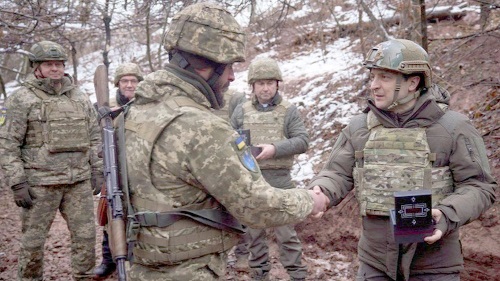
UKRAINE: Is Russia Resuscitating Soviet-Era Glory?
The clock is ticking and some have argued over the weeks that a full-blown Russian invasion of, part of, if not the whole of Ukraine is a matter of ‘when’ and not ‘if’.
The fall of the Berlin Wall heralded the splinter of former Soviet territories into fragments of republics with the avowed tendency to lean to the West exposing Russia to direct threat in case of a Third World War in future.
Annexation of Crimea
In February and March 2014, Russia invaded and subsequently annexed the Crimean Peninsula from Ukraine. This event took place in the aftermath of the Revolution of Dignity and is part of the wider Russian-Ukrainian conflict.
On March 6, 2014, the Crimean Parliament voted to secede from Ukraine and join the Russian Federation, with a public referendum on the matter scheduled for March 16, 2014. The move was hailed by Russia and broadly condemned in the West.
Meanwhile, on the day of the referendum, observers noted numerous irregularities in the voting process, including the presence of armed men at polling stations, and the result was an overwhelming 97 per cent in favour of joining Russia. The interim government in Kyiv rejected the result, and the United States (US) and the European Union (EU) imposed asset freezes and travel bans on numerous Russian officials and members of the Crimean Parliament.
Game of Chess
Russia’s latest preparation for what now seems like a potential large-scale invasion of Ukraine was in part sparked by the current Ukrainian government inviting American and NATO forces to conduct joint exercises and engage in other military cooperation to boost Ukraine’s defensive capabilities against further Russian aggression. Despite the flurry of talks between and among Russia, the US, NATO and other allies—including offers to discuss Russian security concerns—since President Biden met with President Putin in Geneva in June 2021, Moscow has shown no sign of easing the pressure. Indeed, it has ramped up its military presence in recent weeks.
Several factors are at play for Moscow and Putin. First of all, the past two years have seen significant changes in Eurasia, where developments seem to have reached a tipping point. Thirty years since the dissolution of the Soviet Union and 22 years since Vladimir Putin came to power, Moscow has successfully reasserted itself as the dominant political force and security provider in the region. Only Ukraine and the three Baltic States that achieved membership in both NATO and the European Union in 2004 have managed to stay beyond Moscow’s grip.
In this context, forcing Kyiv and its leadership back into Russia’s orbit is an unfinished business for Moscow and Vladimir Putin. Ukraine is the regional outlier in what Russia considers to be its “privileged sphere of interests.” Kyiv continues to pursue NATO membership, close ties with Europe and its own economic, political, and foreign policy path, as well as building up its military forces in evident opposition to Russia.
Soviet-Era Nostalgia: A Possible New World Order
As far as the US is concerned, Putin has taken Russia’s ambitions and positions beyond Eurasia and Europe. Russia is consolidating relationships with US adversaries with the blatantly signalled goal of challenging America’s global posture. At the end of January, for example, President Putin met with Iranian President Ebrahim Raisi to discuss economic, political and military ties. On January 21, Russia, Iran and China also began joint naval drills in the northern Indian Ocean, performing joint tactical manoeuvring and practising artillery fire at naval targets, as well as conducting search and rescue missions at sea. On February 4, presidents Putin and Xi met in Beijing at the start of the Winter Olympics to discuss the current situation in and around Ukraine. These are just a few of many instances of Russian efforts to up the ante and draw our attention in other theatres.
Putin has been quite explicit that successive Russian threats to deploy new nuclear weapons systems, or undermine the current international order are a gambit to get the US to the negotiating table. Russia has long sought a commitment from the US, NATO and the EU that it will have a clearly defined role in post-Cold War European security institutions and decision-making power whenever developments or events run counter to its interests. Russian officials have expressed frustration about the slow response from the US to Moscow’s repeated requests to engage since 2008, when then President Dmitry Medvedev made a proposal for a new European security order in Berlin.
Conclusion
Instead of making Ukraine a prize being bargained between these two world super powers, the United Nations (UN), under the current leadership of Secretary-General António Guterres, should step up to the plate and play a neutral leadership role to curb bloodshed in Ukraine.
Leaving a strategically-positioned country like Ukraine to the vagaries of nuclear-armed nations that are obsessed with their defence and economic interests could spell doom for global peace and security.
The writer is an International Relations and Security Analyst
